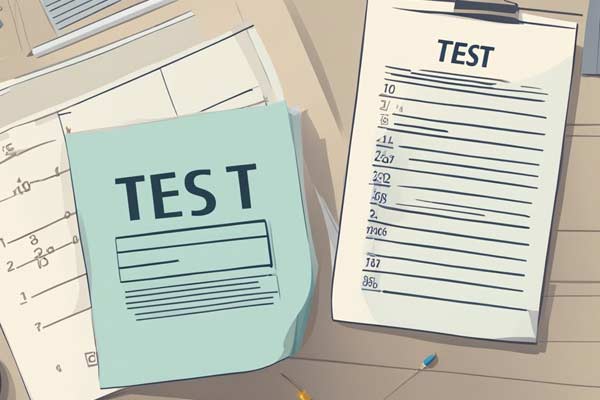How Long Does IELTS Last: Test Duration and Validity
The IELTS is an important test that measures the English language proficiency of non-native English speakers. It is recognized and accepted by universities, immigration agencies, and employers worldwide. One of the most frequently asked questions about IELTS is how long it lasts.
The IELTS certificate is valid for two years from the test date. This means that the test results will be accepted by universities, immigration agencies, and employers for two years after the test date.
The exact validity date is mentioned on the IELTS test report form (ITRF), which is the certificate that sets out the test taker’s score. For example, if the test was taken on November 1, 2021, the IELTS certificate will be valid until October 31, 2023.
It is important to note that the validity of the IELTS certificate does not mean that the test taker’s English language proficiency remains the same throughout the two years.
The test taker’s English language skills may improve or decline during this time, and it is recommended to retake the test if the score is not valid anymore or if the test taker’s proficiency has improved significantly.
Understanding IELTS
The IELTS exam is a well-known English language test widely accepted for studying, working, and migrating. It’s acknowledged by more than 11,500 organizations globally, and in the past year alone, over 3.5 million people have taken the test worldwide.
The IELTS test comprises four sections: Listening, Reading, Writing, and Speaking, and the total test duration is 2 hours and 45 minutes. The Listening section is identical to the IELTS General and IELTS Academic tests.
The duration of this section is 40 minutes, which includes 30 minutes for listening and answering the questions in the booklet and 10 minutes for copying the answers into a special examination sheet.
The Reading section of the IELTS test lasts for 60 minutes. This section includes three long passages, and the test taker needs to answer 40 questions based on the passages. The questions are of various types, including multiple-choice, matching, and sentence completion.
The Writing section of the IELTS test also lasts for 60 minutes. This section consists of two tasks. In Task 1, the test taker must describe a graph, chart, or diagram in at least 150 words. In Task 2, the test taker needs to write an essay of at least 250 words on a given topic.
The Speaking section of the IELTS test lasts for 11-14 minutes. This section is a face-to-face interview with an examiner. The test taker must answer various questions about personal experiences, opinions, and general topics. During the interview, the examiner evaluates the test taker’s fluency, pronunciation, grammar, and vocabulary.
🌟 Hey Students! 🚀 Ready for the ultimate experience? Join us on Studentsinside.com's Facebook, YouTube, WhatsApp, and LinkedIn. Click now for tips, fun, and success vibes! 🌈✨ #StudentLife #JoinUs
Types of IELTS Test
There are two types of IELTS tests: IELTS Academic and IELTS General Training. Both tests assess the English language proficiency of non-native English speakers, but they are designed for different purposes.
IELTS Academic
IELTS Academic is intended for those who want to study at an undergraduate or postgraduate level in an English-speaking country. The test assesses the test-taker’s ability to understand, read, write, and speak academic language.
The test has four parts: Listening, Reading, Writing, and Speaking. The Listening and Speaking parts are the same for both tests. But, the Reading and Writing sections in IELTS Academic are a bit harder. They need more academic words and better writing skills.
IELTS General Training
IELTS General Training is for people who want to work or live in an English-speaking place. The test checks how well you can talk in regular situations.
The test has four parts: Listening, Reading, Writing, and Speaking. Listening and Speaking are the same for both tests. However, the Reading and Writing parts in IELTS General Training are easier. They need everyday words and basic writing skills.
Test Format
The IELTS test is divided into four sections: Listening, Reading, Writing, and Speaking. The total test time is 2 hours and 45 minutes, and the format is the same for both the Academic and General Training versions of the test.
Listening
The Listening part contains four sections, each containing ten questions. The recordings are played once; you’ll have time to read the questions before each section starts. The recordings last about 30 minutes in total. Afterward, there’s an extra 10 minutes at the end for you to transfer your answers to the answer sheet.
Reading
In the Reading section, you’ll find three passages, and there are a total of 40 questions. These passages are extracted from various sources like books, journals, magazines, and newspapers.
If you’re taking the Academic version of the test, you can expect more academically oriented passages. On the other hand, the General Training version features passages more related to everyday life. You have 60 minutes to finish the Reading section, so manage your time wisely.
Writing
The Writing section consists of two tasks. Task 1 requires test-takers to describe information presented in a graph, chart, or diagram, while Task 2 requires test-takers to write an essay responding to a prompt.
Test-takers have 60 minutes to complete both tasks. The Academic version of the test requires more formal language and focuses on academic writing, while the General Training version focuses on more everyday writing tasks.
Speaking
The Speaking section is a face-to-face conversation between the test-taker and an IELTS examiner. The discussion is divided into three parts. In Part 1, the examiner asks the test-taker general questions about themselves and their life.
In Part 2, the test-taker is given a topic to speak about for two minutes. In Part 3, the examiner asks the test-taker more abstract questions related to the topic in Part 2. The Speaking section takes approximately 11-14 minutes to complete.
Scoring and Results
After taking the IELTS test, candidates will receive an overall test score of 0 and 9 on the IELTS scale. Additionally, they will receive a score for each of the four sections of the test – Listening, Reading, Writing, and Speaking. The IELTS scale helps organizations understand a candidate’s level of English proficiency.
The IELTS band scores range from 0 to 9, with 0 being the lowest and nine being the highest. Each test section is scored individually; the final score is an average of the four sections. The scores can be whole-band (e.g., 5.0, 6.0, 7.0) or half-band (e.g., 5.5, 6.5, 7.5).
Candidates will receive their IELTS Test Report Form (TRF) approximately 13 days after the test. The TRF will show the candidate’s overall band and individual scores for each test section. The TRF will also show the candidate’s photograph, personal details, and the test date.
The validity of the IELTS test results is two years from the test date. After two years, the test results will no longer be valid. Suppose a candidate wants to use their IELTS test results for a specific purpose, such as immigration or university admission. In that case, they should confirm the validity period of the test results with the relevant organization.
If a candidate is unsatisfied with their results, they can request a re-marking of their test within six weeks of the release date. However, this process can take up to six weeks, and the score is not guaranteed to change.
Validity of IELTS
The validity period of an IELTS certificate is an important aspect to consider for anyone planning to take the test. IELTS scores are typically valid for two years from the test date. If candidates took the test on April 1, 2023, their scores would be valid until April 1, 2025.
It is important to note that the exact validity date of an IELTS certificate is stated on the test report form (TRF). The TRF is the certificate that sets out the candidate’s scores. Therefore, candidates should check their TRF to know when their scores will expire.
If a candidate’s IELTS certificate has expired, they must retake the test to obtain a new certificate. This is because expired scores are not accepted by most institutions and organizations that require IELTS scores as proof of language proficiency.
It is worth noting that IELTS scores cannot be extended or renewed. Therefore, candidates should plan their test-taking accordingly to ensure that their scores remain valid for the duration they need.
In summary, the validity of an IELTS certificate is two years from the test date, as stated on the test report form. Expired scores are not accepted, and candidates must retake the test to obtain a new certificate. It is essential to plan test-taking accordingly to ensure that scores remain valid for the duration needed.
IELTS for Migration
The IELTS is a widely recognized English proficiency test for immigration purposes. Many countries require IELTS scores for migration and visa applications to prove English language proficiency. The validity of IELTS scores is essential for those planning to migrate to another country.
IELTS scores are valid for two years from the date of the test. This means that test takers can use their IELTS scores for migration purposes within two years of taking the test. After two years, the scores expire, and test takers need to retake the test if they want to use it for migration purposes.
It is important to note that the validity of IELTS scores varies depending on the test’s purpose. For example, some countries may accept IELTS scores for a more extended period for skilled migration purposes.
Test takers should check the specific requirements of the country they plan to migrate to and ensure their IELTS scores meet the validity requirements.
In addition, it is essential to note that IELTS scores are just one of the many requirements for migration and visa applications. Other requirements may include educational qualifications, work experience, health, and character requirements.
Test takers should ensure they meet all the requirements before applying for migration or a visa.
IELTS for Higher Education

The IELTS is vital for students pursuing higher education in an English-speaking country. This test evaluates the language proficiency of non-native English speakers and provides an accurate measure of their language skills.
The IELTS test is divided into four sections: Listening, Reading, Writing, and Speaking, with a total duration of approximately 2 hours and 45 minutes.
The Listening, Reading, and Writing sections are completed in one sitting, while the Speaking section can be taken on the same day or within seven days before or after the other sections.
Numerous universities worldwide make IELTS scores a prerequisite for admission. The specific minimum score required varies depending on the university and the chosen program of study. To determine the necessary IELTS score, students should review the admission requirements of their selected universities.
The IELTS test is specifically designed to assess the language skills of students aiming for undergraduate or graduate-level studies. It mirrors the characteristics of academic language and gauges whether students are adequately prepared to commence studying or training in an English-speaking environment.
IELTS in Different Countries
IELTS in Australia
In Australia, the validity of IELTS results is two years. However, your IELTS results are valid for Skilled Migration applications for three years. If you wish to work in Australia, you must take the IELTS Academic test, and different job roles have additional IELTS score requirements. IDP and the British Council conducted the IELTS test.
IELTS in UK
In the UK, the validity of IELTS results is also two years. The IELTS test is accepted by UK Visas and Immigration (UKVI) for visa applications to the UK. The IELTS Academic test is required for university admission in the UK. The IELTS General Training test is required for migration to the UK. IDP and the British Council conducted the IELTS test.
IELTS in Canada
In Canada, the validity of IELTS results is also two years. The IELTS test is accepted by Immigration, Refugees, and Citizenship Canada (IRCC) for immigration and citizenship applications.
The IELTS Academic test is required for university admission in Canada. The IELTS General Training test is required for migration to Canada. IDP and the British Council conducted the IELTS test.
IELTS in New Zealand
In New Zealand, the validity of IELTS results is also two years. Immigration New Zealand accepts the IELTS test for visa applications. The IELTS Academic test is required for university admission in New Zealand. The IELTS General Training test is required for migration to New Zealand. IDP and the British Council conducted the IELTS test.
IELTS in the USA
In the USA, the validity of IELTS results is also two years. The IELTS test is accepted by many universities and colleges in the US for admission purposes. The IELTS General Training test is required for migration to the US. IDP and the British Council conducted the IELTS test.
Test Preparation and Registration
Getting ready for the IELTS test is essential to get a good score. The test checks how well you know English, and preparing well can make you feel more sure and do better. There are different ways to prepare for the IELTS test, like books, training programs, practice tests, and online help.
You can pick from many IELTS books to get ready. These books tell you all about the test and give tips and practice tests. They help you a lot.
You can also join training programs, which can be in person or online. These programs help you understand the test and get better at English. They are suitable for getting ready.
Doing practice tests is very important for the IELTS test. They help you know the test and determine what you are good at and need to work on. There are free practice tests online that you can use to see how ready you are.
To sign up for the IELTS test, follow the steps on the IELTS website. It’s easy. You need to give information about yourself, pick a date and place for the test, and show a valid ID like a passport or national identity card. This makes sure you can take the test without any problems.
Test Day Guidelines

On the IELTS test day, candidates are expected to arrive at the test center at least 30 minutes before the scheduled test time.
This will allow enough time for the candidate to complete the necessary registration procedures, such as presenting identification documents and having their photograph taken.
Once the test begins, there will be no breaks during the Listening, Reading, and Writing tests, which will take 2 hours and 40 minutes. Candidates cannot bring food or drink into the test room except for water in a transparent bottle.
Candidates should also be aware that they cannot bring any electronic devices, including mobile phones, into the test room. Personal belongings, such as bags and coats, should be left in a designated area outside the test room.
To avoid being disqualified, candidates should ensure they have read and understood the test day guidelines provided by the test center.
This includes guidelines on what identification documents are acceptable, what to do in case of illness or other emergencies, and what behavior is considered inappropriate during the test.








